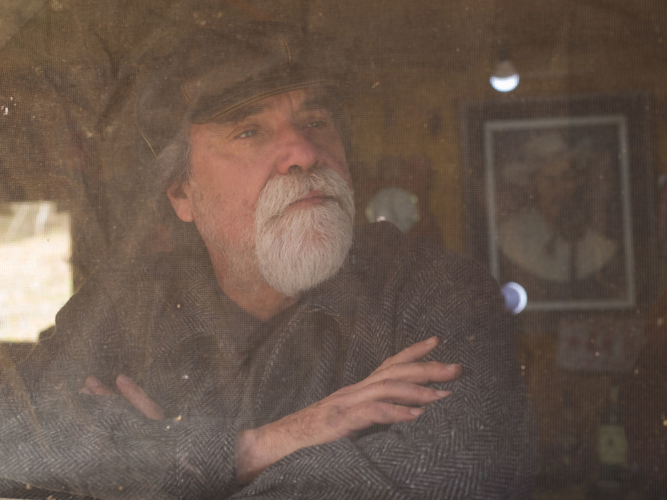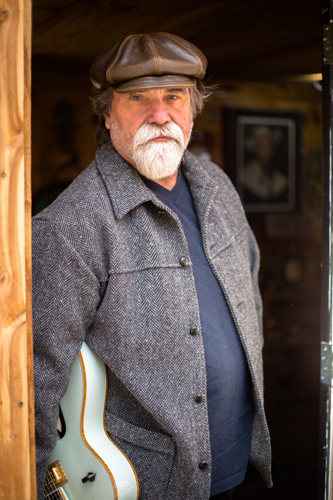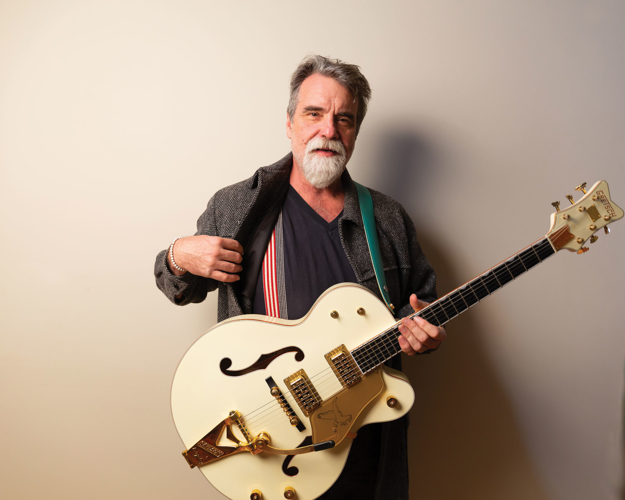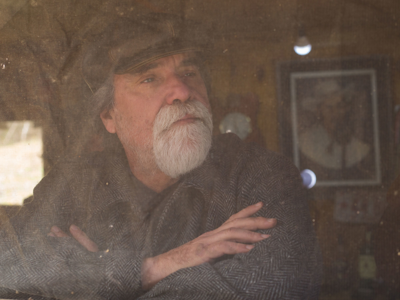
Like most musicians, Darrell Scott has been hit hard by the loss of live-performance income due to the pandemic. But rather than moping and moaning about his fate, he has stayed busy at the things he can control. So far in 2020, he has released two new albums as well as an archival single from his time with Robert Plant’s Band of Joy, produced the new Hayes Carll album and gone deep into building a new home studio out in the country. And he has two-and-a-half more albums in the pipeline, almost ready to go.
Though Scott still owns the Nashville house he’s had for decades, he’s spending more and more time at his 500-acre property on the Cumberland Plateau, two hours east of town and north of I-40. Nashville is where he wrote songs for the Dixie Chicks, Guy Clark, Brad Paisley, Alan Jackson, Patty Loveless and Montgomery Gentry, but the plateau is where he’s writing his next crop of songs. He often writes them while he’s out in his untracked woods, trying to figure out where to establish trails for his daily walks.
“I find that nature speaks to me the way songs can speak to me,” Scott says over the phone from his country home. “When I’m thinking about where to put a trail, I’m always assessing where the westerlies are coming from, where there might be an old logging road we can repurpose as a trail. Going on a wander like that, where you don’t know where you’re going, is like writing a song. You take a turn you didn’t expect, and you find something new. When I’m thinking about a new song, it’s quiet I’m looking for, and that’s what I’m looking for out here.”
Because he’s always writing new songs and rearranging old ones, Scott ends up with a lot more promising material than he can fit into a conventional album-release schedule. Now that he’s no longer driving to the Nashville International Airport and flying off to some 200 live shows a year, he has the time to pull out those orphaned songs and arrangements buried deep in his computer and spruce them up for public release.
“I’ve worked with plenty of people who use their 12 latest songs as their album,” Scott says, “but that’s not how I think about it. In my world, the songs just came out on their own. Anytime I’ve tried to write something for my next album, for George Strait’s next album, for my girlfriend, for my publisher — it always ends up as a lesser song. The better song comes when you don’t know what it’s for — they go where they want to go, and I’m just hanging on for the ride.
“So I end up having more songs than I have records to handle them,” he continues. “I just want to honor the songs I have, so they can see the light of day, so I can cleanse my system. You can’t wait for the perfect business moment to release them, because there isn’t one.”
The first album Scott released in 2020 didn’t include any of his own songs, but was organized around arrangements that moved the blues influence in Hank Williams’ songs from the background to the foreground. The result, Darrell Scott Sings the Blues of Hank Williams, was released in April on Scott’s own Full Light Records.
“I grew up in Indiana with a dad who had two heroes in life: Hank Williams and Johnny Cash,” Scott explains. “So I knew Hank’s catalog as a child. My dad was a songwriter, not a professional but a songwriter who just had to write, and I was inundated by that approach. Recently I asked myself, ‘Why can’t you take a Hank song and blues it up?’ It’s not something I’m putting in there; it’s already in there. I knew certain Hank songs could handle that very easily.”
He avoided the overly familiar Williams songs and dug out the overlooked gems. He turned “My Sweet Love Ain’t Around” into an R&B rave-up with Reese Wynans’ B-3 organ filling all the spaces. He followed that with a version of “Lost Highway” cast as laid-back country-blues. “Men With Broken Hearts,” one of Williams’ religious recitations in his Luke the Drifter guise, is remade as a 2020 morality tale with “The Star-Spangled Banner” reharmonized with jazz chords in the background. Richard Thompson’s bassist Danny Thompson and Buddy Miller’s drummer Marco Giovino anchor the bottom, while Shad Cobb’s fiddle matches Scott’s slide guitar on the uptempo breaks.

Scott’s second album of the year, Jaroso, was released in October. It’s named after a Colorado town near the New Mexico border where a friend of Scott bought an abandoned adobe sanctuary that was once a Catholic church. The more his friend described it, the more Scott realized it could be the perfect spot for the live album he’d always wanted to make.
“I love live albums,” he declares. “I’ve done a few of them, and I love other people’s live albums. But a P.A. is not a friend of the live recording; it’s always ringing off the walls and creating problems. I knew this church was small enough that I could sit up there with my instruments and play for 40 to 50 people in an intimate way with zero amplification, just four mics: two on the room, one on my voice and one on my guitar or banjo. I thought it would have a real immediacy, and I was right.”
Eleven songs from that evening made the album, and Scott had previously released recordings of only five of them. Kicking off the proceedings is the remarkable “There’s a Stone Around My Belly,” an anthemic tribute to his pastoral retreat on the Cumberland Plateau. “I’ve been up on a mountain,” he sings over the waves of melody, “I’ve been rolling like a stone / Searching this whole world over for a place to call my own / Alone to see the sunset, and to count what I have lost / Alone to read Walt Whitman and live like Robert Frost.”
The six unreleased tracks include enthusiastic covers of songs associated with Merle Haggard, Hoyt Axton, Mickey Newbury and Malcolm Holcombe. The unreleased originals are “No One Needs an Angel,” an a cappella look back at a messy adolescence, and “The Hummingbird,” a kind of sequel to “Randall Knife” by Scott’s former employer Guy Clark. In this case, a young son didn’t break the tip off a knife, as in Clark’s song. But he did want to see if his father’s Gibson Hummingbird guitar would float in the nearby swamp. It didn’t.
Scott went for a similar stripped-down aesthetic when he produced Hayes Carll’s latest album, Alone Together Sessions, released in September. This project grew out of a Christmas party at Carll’s Nashville home last winter. When he and Scott pulled out the guitars to play a few tunes, the host said, “Man, this feels so good; we have to record some of this.” Scott, not being a sports fan, obliviously scheduled a session for Sunday, Jan. 12, when Carll’s favorite NFL team the Houston Texans was playing in the divisional playoffs against the Kansas City Chiefs.
Despite that distraction, the sessions went well, and Carll released the three recordings from that day as digital singles: “Times Like These” from his 2019 album What It Is; “Sake of the Song,” a co-write with Scott originally recorded in 2016; and the Lefty Frizzell/Johnny Rodriguez/Merle Haggard hit “That’s the Way Love Goes,” done as a duet with Carll’s wife Allison Moorer. That encouraged Carll and Scott to continue, and they worked up eight more Carll originals, including “Drunken Poet’s Dream,” done as a duet with co-writer Ray Wylie Hubbard.
Once the pandemic set in, of course, they had to change their work habits. Carll would record the vocals and rhythm guitar in his bedroom and send the tracks over to Scott, who would add embellishment on various fretted instruments in his kitchen. The songs came from all phases of the singer’s career and allowed him to rethink the compositions.
“The songs became less ornate,” Scott observes. “They became more what they truly are, without all that production. The song should always be the leader of the pack — it has to come forward. Here’s one of the ironies in our business. We record a song, and it’s frozen in one eternal form, even though we play it with different bands and different arrangements in 200 shows a year. Why do we have to be slavish about the way it was recorded 17 years ago, as if it were never to be altered, never to be touched? I’ve always believed that songs are living things, that they can be handled more than one way in one person’s career.”
In July, Scott released a digital single of “Satisfied Mind,” originally a 1955 Porter Wagoner hit. During the 2010-2011 world tour by Band of Joy — a group led by Robert Plant and featuring Scott, the aforementioned Miller and Giovino as well as Patty Griffin and Byron House— Scott would step into the spotlight and sing lead on “Satisfied Mind.” This live recording from the tour was also added as a bonus track to Jaroso.
“It was an unusual group,” Scott says of Band of Joy, “because Buddy, Patty and me are all singer-songwriters who can step out front, but also support Robert. The business irony is that we made the album during the first two weeks we knew each other, and after two years of touring, we’d become the band that could make the record we should have made. That’s the recording I would have wanted to hear. Robert loves to keep moving creatively. He went on to the next project, and I totally respect that. But if the call came for that band again, I’d be the first one on the bus.”








